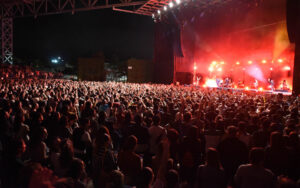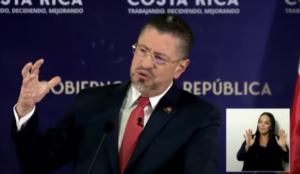Often considered a haven of stability and democratic vigor in Central America, Costa Rica is not immune to contemporary forms of populism. In May 2022, Rodrigo Chaves, a former World Bank economist and former finance minister, assumed the country's presidency with promises of "historic changes" in the face of growing inequality. During the campaign, Costa Rican media reported serious allegations against him, including suspicions of sexual harassment and illegal campaign financing. In response to this, the then-candidate and now president began a systematic persecution of some news outlets, with frequent verbal attacks and attempts to use the institutions for political purposes.
Three news outlets that are audience leaders in their respective sectors are at the center of the attacks: daily newspaper La Nación, TV station Canal 7, and news portal CRHoy.com. Chaves has already used terms against them such as "scumbag press" and "political assassins.” On social media, an army of trolls and bots in his support floods the publications of the news outlets with curses and provocations. Even more seriously, State power has been used to try to economically suffocate La Nación.
Although the offensive has aroused a strong reaction from Costa Rican institutions, including its Supreme Court, the situation was unthinkable until the recent past. This is a cause for concern among journalists and defenders of human rights and freedom of expression.
The most serious attack so far has been against La Nación. In 2015, as an attempt to expand its sources of funds, the group that owns the newspaper opened a large entertainment and events center called Parque Viva. The complex includes an amphitheater with a capacity of 16,000 people, a space for corporate fairs and a cycling track. La Nación's director, Armando González, told LatAm Journalism Review (LJR), that the initiative "required a very large investment, and was going more or less as planned, giving us the possibility to diversify revenue.

Crowd of people watching a show at the Parque Viva amphitheater (Photo: Courtesy)
In July of last year, when Chaves had been in office for two months, the Costa Rican Health Ministry suspended the health license of the event center, claiming "to be responding to anonymous complaints and denunciations."
At the time, the Ministry of Health said in a statement that the closure was due to "problems caused by huge traffic jams created by large events taking place in Viva Park, in Guácima de Alajuela, which directly affect this community, as well as neighboring towns." The document also said that, "The high vehicle traffic generated by these events is not compatible with the need and constitutional duty of the authorities to protect the life and integrity of people," the document added.
According to González, however, it is "very clear that the legal action was a reprisal for the journalism done by La Nación, and the information that the newspaper was offering the country."
Earlier in Chaves’ campaign, the newspaper revealed that the World Bank had found Chaves guilty and punished him for "sexual assaults" and an "unwanted pattern of inappropriate behavior" between 2008 and 2013, when he worked for that organization. This internal decision by the organization came just before the economist resigned from his position and was announced as Costa Rica's Finance Minister in October 2019.
Furthermore, in March 2022, between the first and second rounds of the presidential election, La Nación reported Chaves' suspected illegal campaign financing. The case, which has since had new ramifications, is currently being investigated by the Supreme Electoral Tribunal, which has issued reports to the Public Prosecutor's Office, and may constitute an electoral crime.
These allegations, in addition to others posted by Channel 7 and the portal CRHoy.com, have provoked Chaves' ire. "We are a tsunami and we are going to cause destruction. We are going to wreak havoc on the corrupt structures of La Nación and Canal 7 (...) Listen to me Armando González, here we are," he said while campaigning.
In view of the legal action against Parque Viva, it was impossible not to think of retaliation. "It was a very clear case of retaliation or revenge. Everything had been preceded by a series of statements by the president to generate distrust about the finances of La Nación," Eduardo Ulibarri, director of La Nación from 1982 to 2003 and now a political consultant, told LJR. "It was an evidently arbitrary and hostile decision, something that a Costa Rican government had never used before. It was clear that the president was willing to use the power of the State, and not just rhetoric, against the press."
The decision was especially shocking in a country whose democracy was considered so consolidated that, more than a century ago, it earned the nickname "the Switzerland of Central America." In 2021, Costa Rica ranked 5th in Reporter Without Borders' (RSF) global press freedom rankings, behind only Nordic countries.
La Nación's own journalists filed a lawsuit before the country's Supreme Court, saying that "less than two months after being sworn in, Chaves began to materialize his threats" against the press, and that the legal action against Parque Viva had "the clear purpose of limiting freedom of expression by indirect means."
Last October, the Constitutional Courtroom - Costa Rica's highest court in charge of civil liberties - ruled in favor of La Nación. In a categorical ruling, the court, “in defense of freedom of the press, an essential pillar of any democracy, declared, by a majority, that a writ of amparo filed by a group of journalists of the newspaper La Nación against the closure of Parque Viva was admissible," the court said through a statement.
According to the president of the College of Journalists of Costa Rica, Yanancy Noguera, the court gave Chaves an important message there. "The reaction of the Constitutional Courtroom was so strong that it is likely to curb any further concrete action by the government," she told LJR.
According to Noguera, however, this does not end the persecution against the independent press. "For Chaves, the press is a permanent enemy. The president needs a continuous confrontation between good and evil, to raise the spirits of people who feel excluded and unprotected. He uses this dynamic of polarization against the press to exploit national frustrations,” she said.
This persecution tactic is expressed in other ways, as well. On Wednesdays, the president holds press conferences. In these, according to González, Chaves has systematically stopped responding to critical media, giving preference instead to a number of smaller independent publications that have recently emerged and are subservient to power.
"They invented a series of draws, but who gets to ask questions are the friendly media. If La Nación gets a turn, the president attacks it and tries to humiliate the journalist," he said. "I have journalists who felt threatened during these interviews. So that's why we don't send anyone from our newspaper anymore. We watch them on Facebook. We lost the possibility of asking, but we were hardly chosen anyway."

Costa Rican President Rodrigo Chaves speaks at a press conference on January 11 (Photo: Screen Capture from Youtube)
The Costa Rican press also faces constant harassment from trolls and bots. When a negative news story appears regarding the government, social media are filled with messages ready to diminish the credibility of the information. There is no evidence that this is a campaign coordinated by the presidency. However, the former Minister of Health, Joselyn Chacón, admitted that she paid for this type of service, noting only that her target was not journalists.
"We don't have the evidence that the use of trolls is led by the government, but there are a lot of similarities between social media and official communications. It's automatic; if something is said [from the presidency], then trolls come out to attack. There are dangerous similarities," Noguera said.
In November 2022, Chaves said that the expression "scoundrel press" was in the past. In recent months, the president has been less belligerent with the press, seeking other targets. "He has been directing his criticism more to other institutions, such as universities and other independent powers," Raúl Silesky Jiménez, president of the board of directors of the Institute of Press and Freedom of Expression (Iplex, by its Spanish acronym), told LJR.
According to Jiménez, despite the attacks, Costa Rican democracy and freedom of the press will survive. "Chaves is from a party that only has 10 deputies out of 57. The system of checks and balances works, there is no immediate reelection, and he still has three years to go. It is clear that he employs a populist discourse that has penetration, using a passionate and aggressive tactic against anyone who question him. Still, the country's democracy will maintain its division of powers and Constitution and overcome this challenge," he said.
For Noguera, the truce is only provisional. "[Chaves] takes breaks, but these do not mean the suspension of actions," she said. "This line must be maintained, with the goal of maintaining a high popularity and strengthening his party for the municipal elections of 2024."
Until then, those on the front lines are the press professionals, who face "very serious risks," according to editorial manager González. "Often, verbal violence has practical consequences. Look at the case of Brazil, where a bunch of crazy people tried to take over the three branches of government. To do damage to a journalist, it only takes one madman."